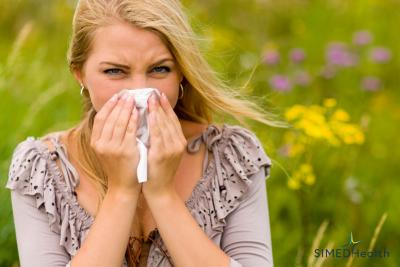
Springtime is peak allergy season. According to the American College of Allergy, Asthma, and Immunology, more than 50 million Americans suffer from allergies. Those same people may also suffer from asthma as well, said Dr. Mercedes Pernice of SIMEDHealth Allergy and Asthma.
“Around this time of year, anyone with grass or pollen allergies is prone to have more symptoms such as coughing or wheezing. Also, if you have insect allergies such as fire ants, wasps or bees, that can sometimes cause anaphylaxis, which may affect your airways,” said Dr. Pernice said.
In some cases, skin and food allergy sufferers may also experience asthma symptoms. This is what’s known as allergic-asthma, she added.
“It’s easy to see why your asthma may be connected to your allergies,” Dr. Pernice said, “Both your upper and lower airways are connected and allergies and asthma often have the same triggers. I think it is very important to recognize and manage your symptoms, especially with asthma, because if left untreated it can be fatal."
Here are a few seasonal tips Dr. Pernice recommends for those suffering from allergies or asthma:
Check the Pollen Count
“During certain times of the day, the pollen count is at its highest. During those times, you’ll want to stay indoors,” she said.
High pollen counts vary based on location, plant types, and temperature. You can check the pollen count in your area by using your favorite online weather resource.
Take Regular Medications
If you suffer from severe seasonal allergies, you’ll want to make sure to take your regular medications such as antihistamines, nasal sprays, and nasal steroids. (It’s important to know that not all allergy medications will cover the allergens or triggers in your area.) Asthma sufferers will need a controller medicine.
You should at least have these medicines on hand, should your symptoms worsen, Dr. Pernice said.
Eliminate Pollen from Unexpected Areas
Not only can pollen get in your airways, it can get on your car, hair, and clothes. Make sure you change or shower after coming inside. You should also remember that pets can bring in pollen and other allergens when they go between the outdoors and indoors.
“Remember to the windows closed, even if it’s nice outside,” Dr. Pernice said.
Vacuuming
If you suffer from indoor allergies as well, you should be thinking about where your triggers will most likely be hiding. Allergens such as dust mites can live on curtains and carpets.
Although vacuuming can help reduce those home allergens, it can also make those allergens airborne and trigger asthma. Dr. Pernice recommends limiting vacuuming to once a week or having someone who is not as sensitive to those allergens vacuum.
If your symptoms are prolonged, recurrent, causing sinus infections or severely impacting your quality of life, it’s important for you to be evaluated by a specialist, such as one here at SIMEDHealth Allergy and Asthma, Dr. Pernice said.
“Here we offer advanced biological and immune therapy which are shown to improve a patient’s quality of life and alleviate symptoms of asthma and allergies,” she added.
Click here to request an appointment with a SIMEDHealth board-certified allergist or immunologist.